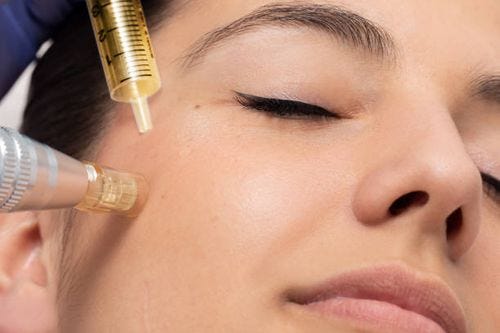CQRM / APRIL 2024 NEWSLETTER
CDC Investigating Cluster of HIV Cases In Spa Clients Who Received Platelet-Rich Plasma With Microneedling
In 2018, the New Mexico DOH was made aware of a case of HIV infection in a woman with no known HIV risk factors who had been receiving “vampire facials” at an area spa earlier in the year.
What IS A Vampire Facial?
Vampire facial refers to an elective, cosmetic procedure involving the use of platelet-rich plasma (sometimes abbreviated as, PRP). The procedure includes drawing blood from the customer’s arm. The platelet-rich plasma is then separated from the other components in the blood. This platelet-rich plasma is applied to the participant’s skin, via a microneedling device.
The New Mexico Investigation
NMDOH and the CDC launched an investigation into the spa's services in the summer of 2018. In the course of that investigation, NMDOH identified four ex-spa clients and one ex-spa client's sexual partner. All were diagnosed with HIV infections between 2018 and 2023. All had reported low behavioral risks associated with the acquisition of HIV, so the NMDOH conducted a nucleotide sequence analysis (NSCA) of all cases.
The NSCA detected very similar HIV strains. Transmission of HIV through unsterile injecting practices is a well-known risk, but it is important to identify novel routes of transmission among individuals with no HIV risk factors.
Their investigation went on to identify 59 clients at risk.
These included 20 who received PRP with microneedling at an area spa and 39 who received other injection services at the same spa in question. They cross-referenced them with the state HIV registry and identified one spa client who received a diagnosis of HIV in 2012.
The active case finding period ran from spring 2018 (when the first patient was admitted) to fall 2018 (when this particular spa closed). The owner of the spa was found to be operating multiple locations without appropriate licenses and had no appointment scheduling system to store client’s contact information.
Investigators collected and cross referenced names and phone numbers from client consent forms and handwritten appointment records as well as telephone contacts to compile a list of clients who may have been affected. The team was unable to collect specimens at the spa during the inspection of September 2018, as the inspection was performed under the authority of the N.M.R.L.D., which does not have authority over the collection of specimens. CDC reviewed this activity as not research and conducted it in accordance with relevant federal law and the CDC policy.
Blood samples were submitted to the CDC for nucleotide sequencing for cluster association and case status determination. All 5 patients were confirmed spa related cases. Medical Records Review and Clinician Interviews were performed on all confirmed patients. NMDOH interviewed 3 patients. The patients ranged from 40-60 years old. HIV diagnoses occurred from summer 2018 to spring 2023. 2 patients were in stage 1 disease and 3 patients were in stage 3 disease at time of diagnosis. All 4 female patients received PRP + microneedling treatment at the spa in question.
Read the full CDC investigation breakdown here:
https://www.cdc.gov/mmwr/volumes/73/wr/mm7316a3.htm
What’s The Take-Away?
This case highlights the importance of identifying new potential sources of HIV transmission in individuals without any known risk factors.
It also shows us how critical the proper infection control measures are in spas that provide cosmetic injections. Implementation of standard operating procedures, paired with appropriate training, play a significant role in preventing the spread of HIV and other blood-borne diseases. Spas providing these services should also be keeping detailed client records as these can aid in investigating suspected cases of transmission.
To protect themselves from blood-borne pathogens, spa patrons should consider the following:
Confirm in advance of any appointment that the establishment possesses a valid license and registration to administer cosmetic injections and procedures.
It is essential to actually identify certifications, permits, and licenses (these should be prominently displayed at the spa or on their official website).
Ensure that needles and other disposable supplies are sourced directly from their original packaging and are not reused. This practice is of utmost importance in order to prevent the transmission of HIV and other bloodborne pathogens.
Remain cognizant of the risks associated with non-sterile cosmetic injection services and adopt necessary precautions to minimize exposure.
Prioritize inquiring about the spa's infection control procedures and protocols for handling and disposing of needles and other medical supplies.
Resources:
CDC
istockphoto
https://www.cdc.gov/mmwr/volumes/73/wr/mm7316a3.htm
NIH
Unsplash




